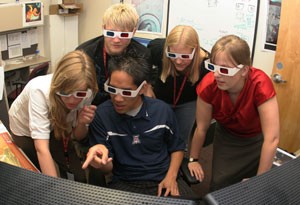Arizonans don’t even bother to reset their clocks twice a year for daylight saving time. Team members on the UA-led Phoenix Mars mission have to reset their clocks every single day. Call it Martian Standard Time, except that, for team members, there are no standard times.
“”You have to realize that Earth time is pretty much irrelevant,”” said Clayton Chu, an instrument downlink engineer. “”If you tell yourself that you’re going to only eat breakfast between the hours of 8 a.m. and 12 p.m. you will fail miserably.””
Because a day on Mars is 40 minutes longer than on Earth, shifts at the UA’s Science Operations Center are pushed back forty minutes later every day. That might not seem like much, but it comes out to a 12-hour flip in the schedule every eighteen days. For Chu, that sometimes means omelets and orange juice at 3 p.m. and dinner after work at 6 a.m.
“”If you eat breakfast within an hour of waking up, you’re fine,”” he said. “”The idea is that you have to adjust your schedule to work with your body clock and not with your time clock.””
The rigorous hours and whacked-out schedule take their toll. Peter Smith, the mission’s principal investigator, thanked his team members at a press conference early in the mission for volunteering to live in “”perpetual jet lag.”” When asked at another such conference if he was tired, Smith said, “”Exhausted is more like it.””
“”This isn’t an easy road to go down, both for me and the other people working on this mission. It’s hard work,”” said mission engineer Rick McCloskey.
He said that, especially in preparing for the mission, his team would sometimes work 60-hour weeks, but despite the long hours, passion for ‘Phoenix’ kept people coming in day after day.
Team members said that it is often harder to get people to go home than go to work.
“”Working full time on Mars, it’s actually a lot more (hours) than working full time on Earth,”” said Mark Lemmon, who leads the mission’s Stereo Surface Imager team.
“”We try to get people to take a day off every now and then, but they will come in on their days off,”” he said. “”It’s hard to keep people away.””
“”It’s hard to stay away and some of us can’t do it,”” said Chu, who is a member of Lemmon’s team. “”Some of us watch at home and e-mail everyone else when stuff’s going on.””
To stave off fatigue, Chu said that every team member works four days and then takes two days off. He said he does come into the office on his days off to check out mission reports and stay informed about what’s going on, but for the most part, he tries to relax and enjoy his time on Earth.
“”You try to take your time off seriously,”” Chu said.
To learn more about the effects of working on the Martian clock, a group of scientists is actually studying a group of ‘Phoenix’ team members who have volunteered, sort of a science project studying a science project.
“”We know from laboratory studies that living on the Martian day causes the circadian system to become misaligned,”” said Laura Barger, an instructor at Harvard’s School of Medicine who is leading the study in fatigue countermeasures.
The circadian system is the 24-hour cycle that humans live on that, among other things, let them know when to sleep and when to wake up. Some of the symptoms associated with a disrupted sleep pattern are disturbed sleep, decrements in performance, and decreased alertness. Her team’s job is to learn more about how to combat these symptoms, as well as to test countermeasures that they have already developed, Barger said.
“”Light is the most powerful time cue to the circadian clock,”” Barger said.
One of her team’s experiments has been to provide volunteers with light emitting boxes that look a bit like computer monitors. Barger’s team times the volunteers’ exposure to the boxes to help cue their body that they need to be awake. More simply, the SOC’s windows are blacked out so that team members do not know what time of day it is outside based on the sun, a powerful visual cue.
Chu said that he also blacks out his windows at home.
“”The sun really screws with your body,”” he said. “”As soon as you see light, your body clock adjusts to that… You shroud yourself in darkness all the time.””









